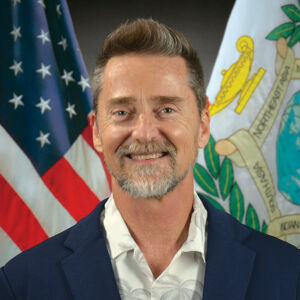Dr. Deon Canyon stands as a distinguished scholar and visionary leader whose remarkable contributions over a few decades have left an indelible mark on the realms of policymakers, crisis managers, wargamers, and health managers. His journey at the Daniel K. Inouye Asia-Pacific Center for Security Studies (DKI APCSS) commenced in 2016, where he quickly established himself as a renowned professor of global acclaim. Over the years, his impact transcended the podium as he transitioned into strategic management, leading to his current role as the Associate Dean for Academics at DKI APCSS.
Dr. Canyon’s diverse narrative is rooted in an eclectic background encompassing theater, arts, disease research and culminating in a science-based Ph.D. on vector-borne disease transmission dynamics. The breadth of his expertise expanded with a master’s in public health management, followed by a second doctorate in business administration, majoring in the intricate realm of crisis leadership.
Noteworthy in Dr. Canyon’s teaching philosophy is a dedication to evidence-based instruction and thought-provoking discussions, fostering systems thinking, critical analysis, and lifelong learning. His andragogic finesse has ignited intellectual curiosity and inspired countless students and colleagues. Dr. Canyon’s influence extends far beyond the classroom, manifesting in over 300 publications, including peer-reviewed books, articles, opinion papers, and chapters. His esteemed role as a Life-Fellow of the Australasian College of Tropical Medicine underscores his unwavering commitment to advancing health security practices.
As Associate Dean for Academics, Dr. Canyon’s journey reflects a natural evolution of his mission. His leadership role embodies a fusion of innovative thinking and strategic vision as he molds the educational landscape and cultivates novel approaches to security studies. Fluent in Melanesian Pidgin and deeply attuned to Pacific Islanders’ cultural nuances, he infuses a unique perspective into his endeavors, enhancing cross-cultural understanding and collaboration.
Beyond academia, Dr. Canyon’s influence is palpable in crisis management circles. He spearheads pioneering initiatives, including the integration of gray-zone wargames and adversarial exercises into transnational security education. These immersive experiences propel decision-making acumen in fast-paced, politically charged crisis scenarios, embodying his unwavering commitment to preparing the leaders of tomorrow. In Hawaii, he thrives in outrigger canoe racing, earning several world championship medals.
The evolution of Dr. Deon Canyon is a narrative of innovation, leadership, and impact. His journey from artist to Associate Dean for Academics exemplifies his dedication to shaping the next generation of security leaders and advancing the realm of security cooperation. As Dr. Canyon continues to chart new paths at the intersection of academia and security studies, his legacy remains an inspiration for both aspiring scholars and seasoned professionals. Through his endeavors, he not only imparts knowledge but also shapes the very fabric of preparedness, resilience, and leadership in the face of ever-evolving security complexities as he continues to inspire and propel the fields he passionately serves.
[print-me target=”body”]






